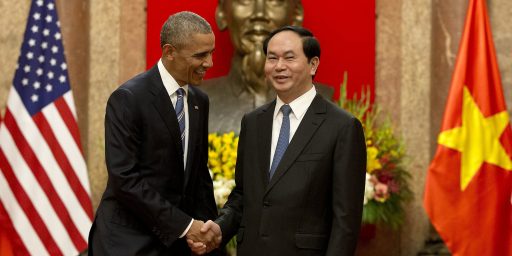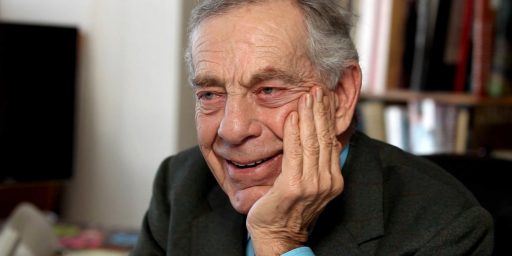The Iraqi and Vietnamese Elections
Kevin Drum, whose writings have lately been quite popular here at OTB, spotlights the following New York Times report dated September 3, 1967:
U.S. Encouraged by Vietnam Vote
Officials Cite 83% Turnout Despite Vietcong Terror
by Peter Grose, Special to the New York TimesWASHINGTON, Sept. 3 — United States officials were surprised and heartened today at the size of turnout in South Vietnam’s presidential election despite a Vietcong terrorist campaign to disrupt the voting.
According to reports from Saigon, 83 per cent of the 5.85 million registered voters cast their ballots yesterday. Many of them risked reprisals threatened by the Vietcong.
….A successful election has long been seen as the keystone in President Johnson’s policy of encouraging the growth of constitutional processes in South Vietnam. The election was the culmination of a constitutional development that began in January, 1966, to which President Johnson gave his personal commitment when he met Premier Ky and General Thieu, the chief of state, in Honolulu in February.
The purpose of the voting was to give legitimacy to the Saigon Government, which has been founded only on coups and power plays since November, 1963, when President Ngo Dinh Deim was overthrown by a military junta.
Rather wisely, Kevin refrains from jumping to any conclusions, noting simply that the story is “pretty spooky.”
Some conservatives may suspect ulterior motives. But I’m actually somewhat pleased that this artifact has come to our attention, because it serves as a reminder of how complicated real democracy is. As I’ve written in the past few weeks, and as Kieran Healy’s recently reiterated, it takes more than just one successful election to achieve democratic order; we need to see, at the very least, a peaceful transition that follows another fair contest. January 30 deserves a special place in history. But, if we’re serious about democratization, then we’ll treat it as the beginning — not the culmination — of comprehensive political reform. Otherwise, we’ll risk the outcome of Vietnam.
With that said, I think that Kevin’s article requires context. The Vietnamese elections, after all, saw dubious practices, as described by this Times piece dated September 30, 1967:
New Vote Urged by Saigon Panel
Assembly Unit Sees Fraud — Police Charge Crowd
By R.W. Apple Jr.SAIGON, South Vietnam, Saturday, Sept. 30 — A 19-man subcommittee of the Constituent Assembly recommended today that the results of the Sept. 3 presidential election be voided because of “a pattern of fraud.”
The recommendation, which is not binding on the full assembly, was adopted at 3 A.M. today by a 16-to-2 vote, with one member abstaining. Six hours later, the assembly began its consideration of the problem.
[…]
[Assembly Speaker Phan Khac] Suu, who ran third in the voting and later denounced it as fraudulent, said members of the committee had examined 9,000 tally sheets and other papers during their investigation. He said many documents had been altered by illegal erasures and crossing out.
“Witnesses told the committee that many officials were forced to sign their names to tally sheets before any figures were entered on them,” the Speaker declared.
This story confirmed the fears of a dozen American senators, who had warned over a month earlier that “the South Vietnamese presidential election campaign was being turned into a ‘fraud,’ ‘farce,’ and ‘charade’ by the ruling military junta” (“Senators Deplore ‘Fraud’ in Vote Drive in Vietnam,” NYT, August 12, 1967).
By contrast, Iraq was relatively well-organized. Note this Agence France Presse dispatch (emphasis added):
Iraq Election Generally Met International Norms: Foreign Experts
A team of international election experts monitoring Sunday’s historic vote in Iraq said it had generally met international norms but recommended improvement in several areas.
“Iraq’s electoral commission has prepared and put in place a framework for an election that generally meets recognized standards in terms of election law, planning and preparations,” the International Mission for Iraqi Elections said in a preliminary report released in Jordan.
“(The election commission) is to be congratulated for the rapid progress it has achieved in establishing the foundations for democratic participation in Iraq, particularly given the short timeframe and arduous circumstances,” said Canada’s chief electoral officer Jean-Pierre Kingsley, who heads the mission’s steering committee.
The Jordan-based mission said it had identified “several strong points regarding today’s election, including the extent and quality of (the Iraqi commission’s) election planning and organization, and its independence.”
[…]
“Our observers remarked that in general the elections went ahead in an excellent way and there was very little fraud or violations. We have not reported any violations by the electoral commission,” said Najem al-Rubaie of the Ain (Eye) group.
Subsequent investigations may unearth fraudulence; I don’t dismiss the possibility. But the overall tenor of the elections suggests that it would be the exception, not the rule.





I would argue there is a fundamental difference. No matter how much support Syria or Iran may be giving to the Iraqi insurgents, it is far far less then that of North Vietnam and the USSR did to the Vietkong.
Good point Jim, but unlike the insurgency in South Vietnam, we still do not have concrete evidence of STATE sponsored support of opposition forces.